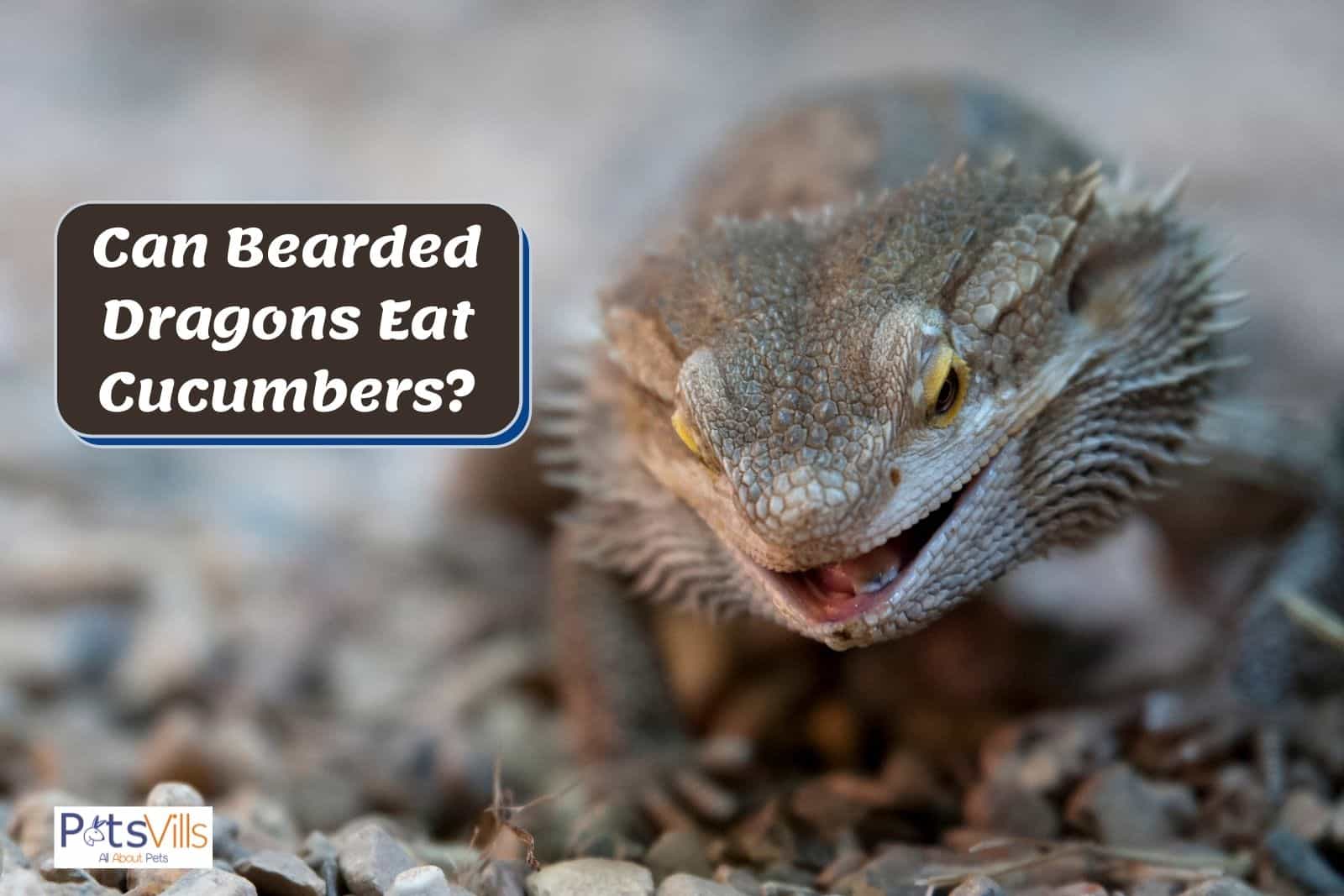Can bearded dragons eat cucumbers or are they dangerous?
Just like any pet, deciding on a balanced diet for a bearded dragon can be tricky.
Even more challenging is understanding which fresh produce is safe for them to eat.
Let’s find out if cukes are a safe addition to their diet!
This post contains affiliate links. We earn a commission if you make a purchase after clicking on our links.
Don’t have time? Check this comparison table of our top faves!
READ MORE: Best Veggies for Bearded Dragons
Table of Contents
Can Bearded Dragons Eat Cucumbers?
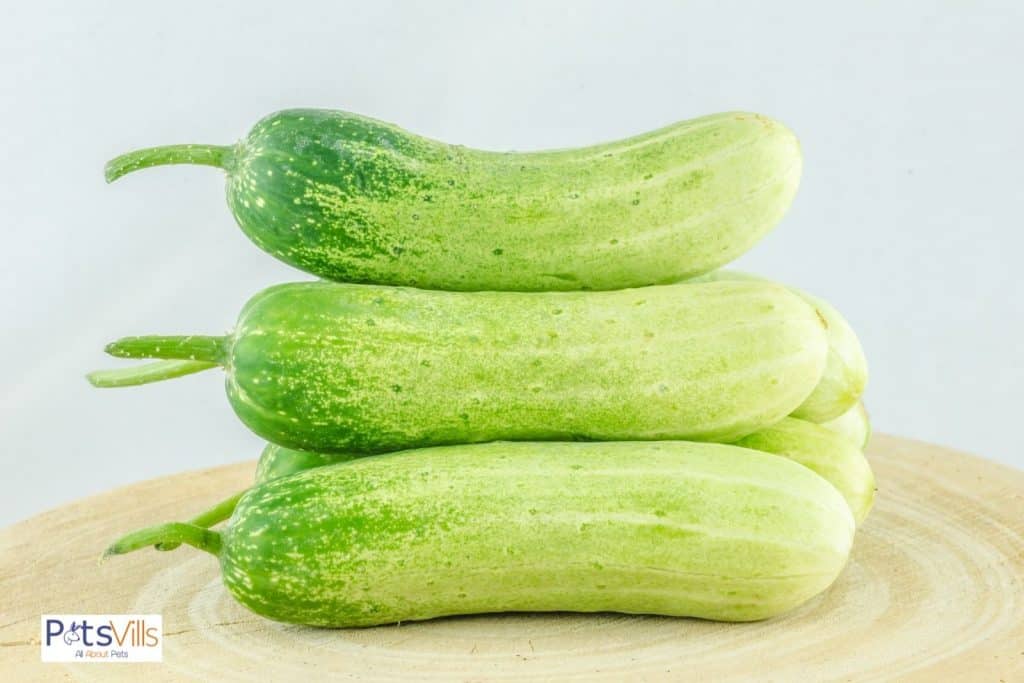
Yes, bearded dragons can eat small amounts of cucumber occasionally.
But, there are a few very important considerations to take before feeding your bearded dragon a cucumber.
Let’s look at those first, then we’ll talk more about other aspects of feeding cukes to your beardie.
1. You must peel the cucumber
First and foremost, your reptile pet can’t chew or digest the cucumber peel. It is also a choking hazard. Therefore, you need to skin any cucumber that you feed your bearded dragon.
2. Seeds pose a risk
We’ll talk more about this in a moment. For now, though, just make certain your scoop the seeds out thoroughly before giving your beardie any cucumber pieces.
3. Only grown dragons can have cucumber
You should not feed your baby bearded dragon or your juvenile bearded dragon any cucumber. Their developing digestive system is incredibly sensitive to most fresh produce.
Most of their diet should come from appropriate feeder insects, with a healthy choice of high-calcium fresh, dark, leafy greens that they can graze on throughout the day.
4. Cut the flesh into bite-sized pieces
Even though cucumber is a soft, fleshy food, your bearded dragon could still choke on a large chunk. Therefore, finely diced pieces are best. Use a kitchen knife to prepare small bites for your dragon.
Do Bearded Dragons Like to Eat Cucumber?
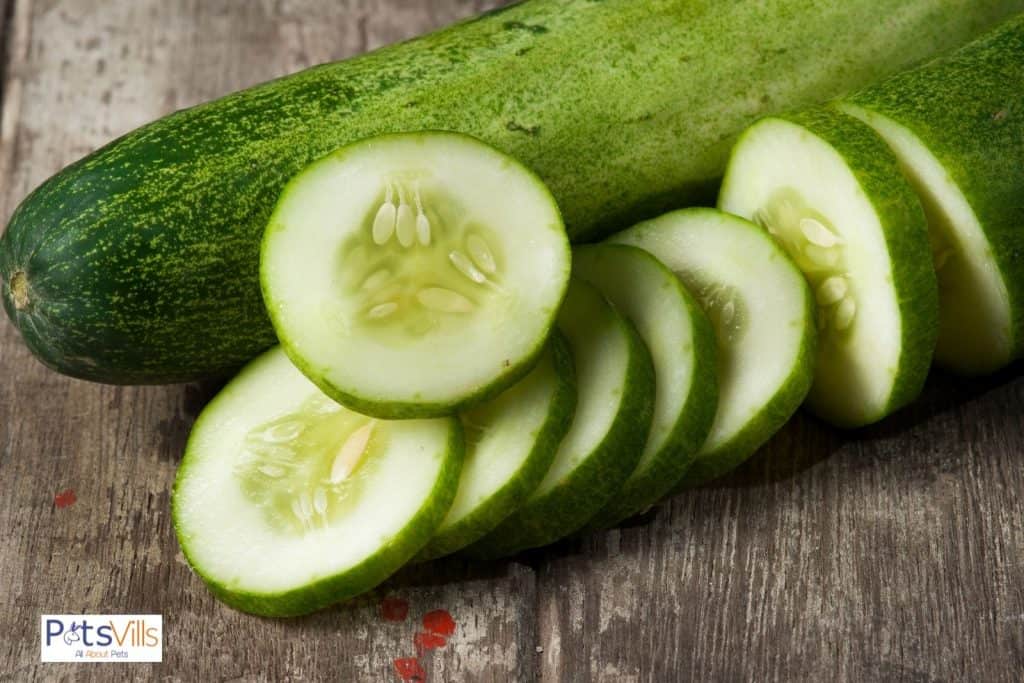
While bearded dragons can eat cucumber, not every pet actually enjoys it. Every beardy owner knows that taste varies from dragon to dragon.
While cucumber has certain benefits such as being a good source of hydration and being high in fiber, it’s not a good option as a staple food.
Even peeled cucumber is only suitable as a snack from time to time, every other week or so.
So if your bearded pal just doesn’t seem to have a taste for it, don’t push it.
Can Bearded Dragons Have Cucumber Seeds?
Bearded dragons should not eat cucumber seeds. This is because cucumber seeds are a serious choking hazard for bearded dragons.
They can also cause digestive problems such as gut impaction since dragons cannot digest them.
Can Bearded Dragons Have Cucumber Skin?
Cucumber skin is both tough and difficult to digest for bearded dragons. They cannot chew it and it can also get stuck in their gut and be difficult to digest.
Therefore, they should never be given cucumber with the skin. Always be sure to peel the skin off.
Do Cucumbers Cause Diarrhea In Bearded Dragons?
Cucumbers have high water content. That sounds great until you consider that your bearded dragon is primarily a desert-dwelling lizard.
Their bodies have unique adaptation for water retention, and a perpetual state of dehydration is not uncommon. So what is the relationship between cucumbers and diarrhea in reptiles?
It is no surprise that too much water is bad for bearded dragons and can cause serious health issues.
Cucumbers are 95% water, so eating too much of them can cause digestive issues and overhydration. Unpleasant health issues such as diarrhea are possible side effects of overhydration.
A little confusingly, hydration-related diarrhea can lead to life-threatening dehydration.
Benefits Of Cucumbers for Bearded Dragons
As an occasional treat, cukes do have a few great benefits for beardies.
Mild Dose Of Vitamins and Minerals
The experienced bearded dragon owner knows how difficult it is to strike a healthy balance for a beardie’s nutritional requirements.
It is a topic that arises when people bring up cilantro for bearded dragons or the risk of them eating too many blackberries. Check our guide on “Can bearded dragons eat cilantro?”
While they require the same vitamins that most vertebrates do, dragons come with several quirky adaptations that make things rather complicated.
They have a very sensitive and fragile digestive tract sensitive that is sensitive to both high acidity and high alkalinity.
Dragons produce their own vitamin C but do not produce enough of it to meet their nutritional requirements.
Their digestive system is also inefficient at absorbing water-insoluble compounds like calcium carbonate.
Cucumber is quite low in vitamins and minerals, merely providing small ‘boosts.’
For the most part, the amounts of nutrients are negligible enough that they do not interfere with your bearded dragon’s diet.
Cucumber is not very acidic either, making it gentle on a dragon’s sensitive digestive system.
Vitamin C
Even though cucumbers are low in vitamin C, the small boost may still offer a beardy some real health benefits. An adult bearded dragon requires supplementary vitamin C.
While microflora in their kidneys produces some vitamin C, it is not enough to sustain them. Vitamin C plays several crucial roles in a bearded dragon’s health.
Vitamin C is an effective antioxidant
Vitamin C is vital to help fight oxidative stress and restore cells.
Because cucumbers are not as acidic as citrus fruits, they are a mild dietary addition to help curb vitamin C nutrient deficiencies.
Vitamin C and the formation of tissue
In addition to its antioxidant properties, vitamin C plays a crucial role in forming numerous tissues. For example, it is a key ingredient for a protein required to produce scales, muscle tissue, and ligaments.
Vitamin C is crucial in healing and maintaining cartilage, bones, and teeth. It also plays an important role in muscle health.
Cucumbers Contain Fiber
Cucumbers have a relatively high fiber content. And bearded dragon diets should contain a fair amount of fiber to keep a dragon healthy.
Although they are not a highly nutritious food, the additional fiber in cucumbers does aid in their digestive health.
However, too much fiber can also cause problems such as runny stool and dehydration, so be careful not to overdo it.
Vitamin K and Blood Clotting
Cucumbers are a good source of vitamin K. Vitamin K is a key ingredient for the formation of the proteins responsible for blood clotting. A vitamin K deficiency can lead to symptoms similar to those of hemophilia.
Potassium
Potassium is also a great benefit of cucumbers. Potassium is an electrolyte that plays a critical role in a healthy nervous system.
Without sufficient potassium, your bearded dragon’s nerves will be unable to communicate signals to its muscles correctly.
Potassium helps maintain a regular heartbeat. It also aids in transferring nutrients into– and waste products out of cells.
Low in Oxalic acid
Oxalic acid or oxalates are chemical compounds commonly found in plant tissue and a wide variety of fruits and vegetables.
Unfortunately, oxalic acid is dangerous as it binds with calcium, often causing kidney stones or a calcium deficiency as they prevent calcium from being absorbed into the bloodstream.
0.02 mg of oxalic per 100 grams of cucumber makes cucumber one of the safer vegetables to feed your dragon when it comes to oxalates.
To help you prepare your bearded dragon food list and diet, check our amazing e-book:
Risks of Feeding Cucumber to Bearded Dragons
Cucumbers aren’t without their risks, though, so let’s explore those.
A Nasty Ratio
An important factor in any healthy and balanced diet is the calcium to phosphorus ratio that a specific food contains. For bearded dragons, that ratio should ideally be between 1.5:1 and 2:1, in favor of calcium.
Cucumbers have a calcium to phosphorus ratio of 0.7 :1, in favor of phosphorus.
The Ca:P ratio impacts several healthy bodily functions, including bone development by preventing the absorption of calcium as phosphorus is a calcium-binding agent. This can cause Metabolic Bone Disease in dragons.
Overhydration
As cucumbers are 95% water, too much cucumber can flood your bearded dragon’s digestive system and cause diarrhea. This in turn can lead to severe dehydration.
Low Nutrient Profile
Despite the presence of some good vitamins and minerals mentioned above, there simply aren’t that many nutrients in cucumber.
They may fill your bearded dragon up, but unfortunately, they don’t provide enough quality nutrition to qualify as a staple diet food.
READ MORE: Can Bearded Dragons Eat Cantaloupe?
How Much Cucumber Can We Feed to Bearded Dragons?
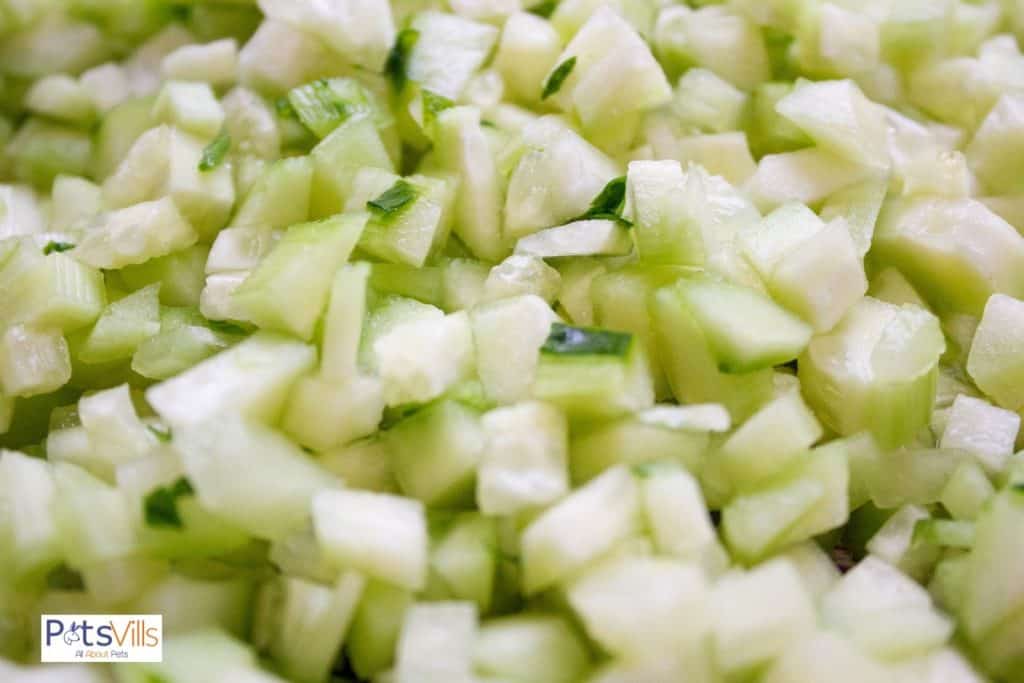
It would be best not to feed your dragon more than about half a handful of diced cucumber flesh every couple of weeks.
But, if cucumbers offer a mild and safe supplement of so many healthy nutrients, why not make them a staple of your dragon’s varied diet?
FAQs
What vegetables do bearded dragons like the most?
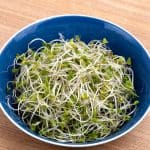
Beardies usually adore turnips, yellow squash, alfalfa sprouts, and broccoli. Just like us, bearded dragons also enjoy foods that are bad for them, these include potatoes and most beans. So it’s up to us to make sure they get mostly dark leafy greens in their diet that are high in calcium, and low in oxalates.
What vegetables can bearded dragons not eat?
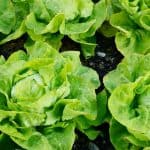
Onions, avocado, lettuce, rhubarb, and beet tops, are some examples of vegetables bearded dragons should not eat.
In general, they can’t eat any food with high levels of oxalates, or a bad calcium-to-phosphorus ratio.
Some vegetables like broccoli are also goitrogenic and interfere with thyroid function if fed too much. You should always consult your vet before introducing your dragon to a new food.
Conclusion
While occasionally feeding your bearded dragon bite-sized cucumber snacks isn’t a major health risk, some other fruits and vegetables offer the same benefits with fewer potential downsides.
Unless they specifically enjoy cucumber, you would do better by offering your bearded dragon broccoli or cilantro as an occasional snack. Always seek veterinary advice before adding a new treat to your bearded dragon food list.
References
- “Bearded Dragons: Common Husbandry and Nutrition-Related Problems.” 2014. Veterinary Nursing Journal. 2014. https://www.tandfonline.com/doi/abs/10.1111/vnj.12190.
- Dix, Michael W., Peter K.T. Pang, and Nancy B. Clark. 1970. “Lizard Calcium Metabolism: Lack of Effect of Mammalian Calcitonin on Serum Calcium or Phosphate Levels in Normal and Parathyroidectomized Lizards, Anolis Carolinensis.” General and Comparative Endocrinology 14 (2): 243–47. https://doi.org/10.1016/0016-6480(70)90052-3.
- Kubiak, Marie. 2020. “Bearded Dragons.” Handbook of Exotic Pet Medicine, August, 219–40. https://doi.org/10.1002/9781119389934.ch13.
- TATLIOGLU, T. 1993. “Cucumber.” Genetic Improvement of Vegetable Crops, 197–234. https://doi.org/10.1016/b978-0-08-040826-2.50017-5.
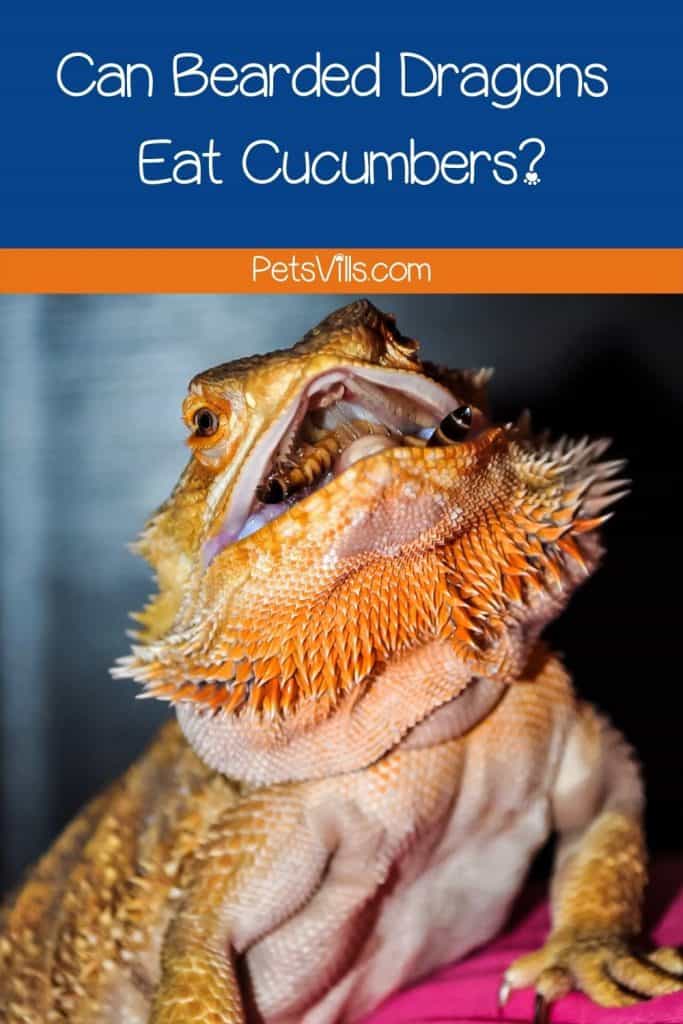
Can bearded dragons eat cucumbers? What are your thoughts on this topic? Please share with us below!
Alina Hartley is a small-town girl with a ginormous love of bearded dragons. It all started with Winchester, a baby bearded who was abandoned at the shelter by his former owners because of a birth defect that caused one front leg to be shorter than the other. Alina originally went to the shelter looking for a guinea pig, but one look at Winchester and it was love at first sight. From that day on, Alina has dedicated her life to learning everything she can about bearded dragons. She loves helping new beardie parents start their incredible journey with these magnificent reptiles.
Follow her on:
LINKEDIN
TWITTER.
Read her latest articles HERE
Learn more about her HERE.

